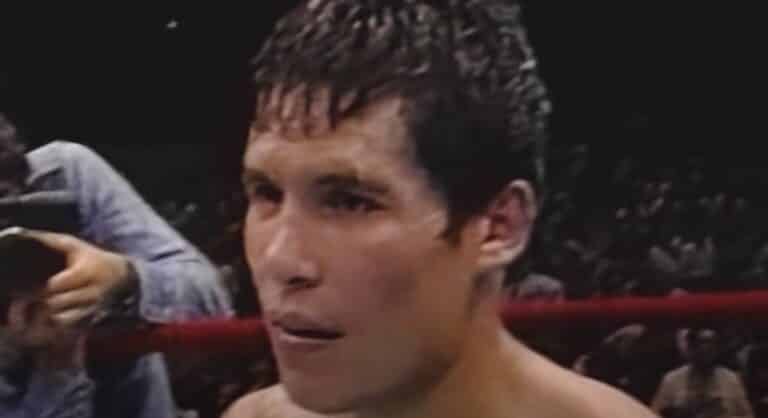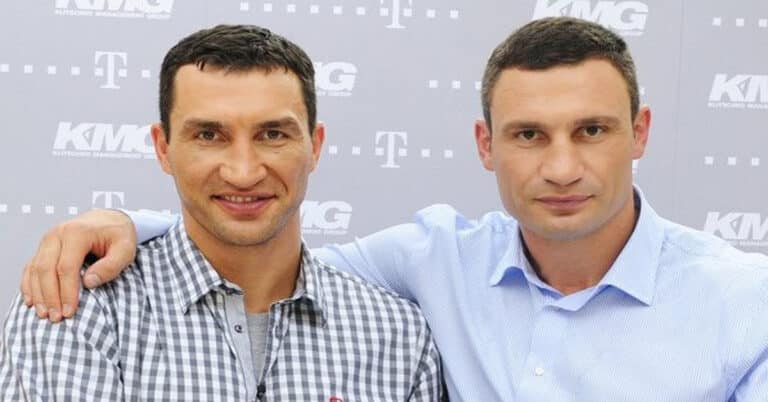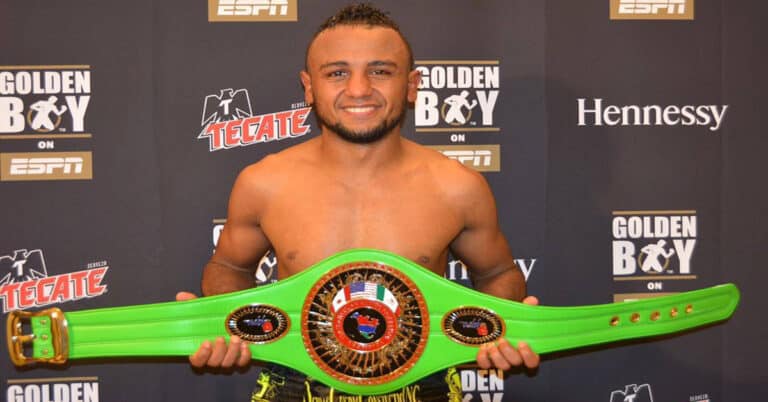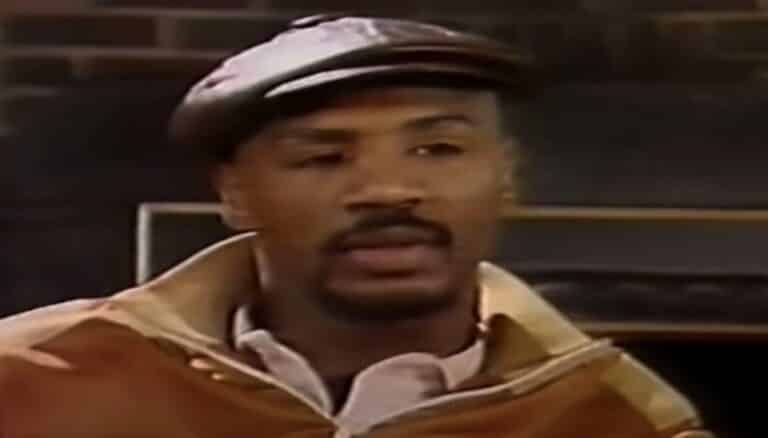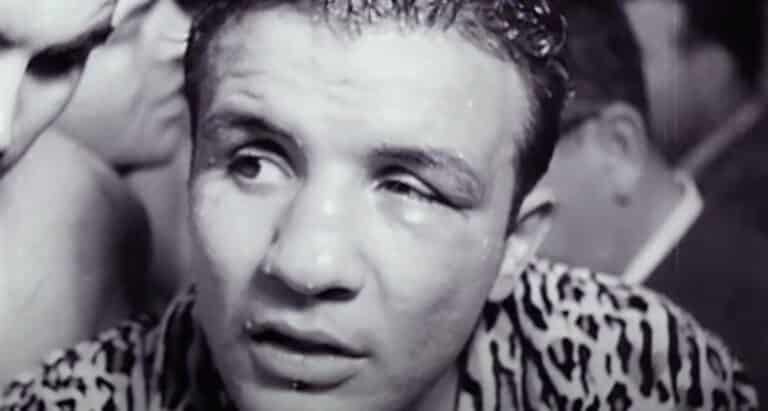Pernell Whitaker “Sweat Pea!”: A Biography
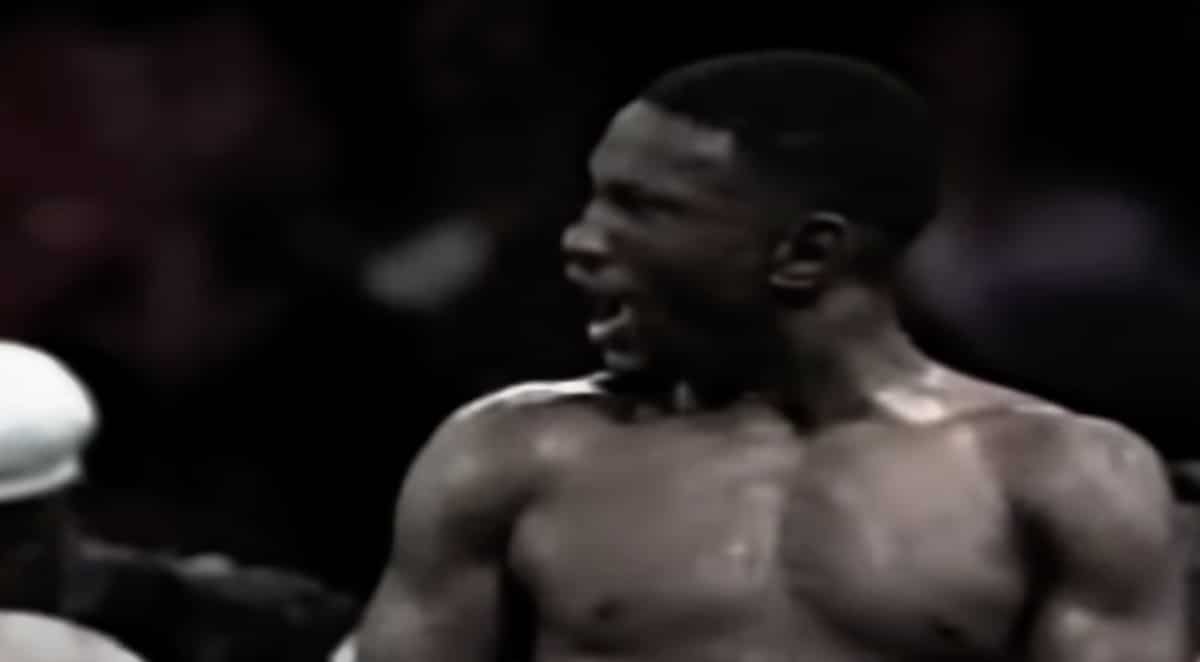
| Date of Birth: | January 2, 1964 |
| Place of Birth: | Norfolk, Virginia. United States |
| Died: | July 14, 2019 |
| Gym(s): | Waering’s gym |
| Location: | Virginia Beach |
| Trainer(s) | Lou Duva, George Benton, Bobby Waering |
| Boxing Career: | Amateur, Professional, Boxing trainer |
| Nicknames: | Sweet Pea |
| Height: | 5 Ft 6 inches. 168cm |
| Reach: | 69 inches. 175cm |
| Stance: | Southpaw |
| Weight Class: | Lightweight, Light Welterweight, Welterweight, Light Middleweight |
| Professional Record: | Total Fights: 46, Wins: 40, Wins by KO: 17, Losses: 4, Draws 1 , No contests 1 |
| Notable Fights: | Pernell Whitaker vs Roger Mayweather, Pernell Whitaker vs Greg Haugen, Pernell Whitaker vs Azumah Nelson, Pernell Whitaker vs Julio Cesar Chavez, Pernell Whitaker vs Oscar De La Hoya, Pernell Whitaker vs Felix Trinidad, |
Pernell Whitaker: Overview
Pernell Whitaker Sr. was an America professional boxer who competed from 1984 to 2001. During this time ‘Sweet Pea’ as he was known held multiple championships at four different weights: Lightweight, Light welterweight, Welterweight and Light middleweight. In addition, Pernell Whitaker was also
- The undisputed lightweight champion
- The lineal lightweight and welterweight champion
- And held the longest unified lightweight championship reign (to date) in boxing history with six title defences.
Indeed Pernell Whitaker’s boxing achievements saw him named ‘Fighter of the Year’ by The Ring magazine and the Boxing Writers Association of America in 1989.
Not considered an engaging fighter to watch by a lot of boxing fans Pernell Whitaker would nevertheless go down in history as one of the greatest defensive boxers of all time. For defensive fighters to be unattractive to watch is not uncommon. What was uncommon was the successful way in which Pernell did this; the calibre of opponents against whom he did it; and his seeming easy in doing so – for it just illustrated how he was the ultimate ring technician and a boxing craftsman’s dream.
Pernell Whitaker: Early Life and Amateur Career
Given Pernell Whitaker began boxing at the age of nine, it was inevitable he would have a rather extensive amateur career. A record of 214 fights, 201 wins, with 91 KO’s were his official statistics, yet it is widely regarded that he fought up to 500 times. Indeed, Whitaker in his own words, credits growing up a ‘scrappy street fighter’ as a big influence on the economic style he honed that would see him take very little damage throughout his entire career
“Two minutes and two seconds,”
he once told Sports Illustrated “that is how long most street fighters
last before they begin to tire”. This was what Pernell Whitaker said he learned as a youngster, how to bide his time during those two minutes and how then to close in for the win. For then “Once you’re tired, I own you,” he concluded.
A combination of these ‘street smarts’ that were a natural product of his growing up in the tough coastal town of Norfolk, Virginia – finding his way to the local gym at an early age; and parents (Raymond and Novella) who provided a stable home life and were supportive of a constructive channel for his energies and talents saw Pernell Whitaker excel. He became a nationally-ranked amateur boxer and traveled all over the country for bouts against other regional winners.
So successful was he, by 1984 Pernell Whitaker had earned the opportunity to represent the United States as a lightweight at the Summer Olympic Games. As part of preparations for the games Whitaker forged close relationships with some other now well renowned American boxers —Tyrell Biggs, Evander Holyfield, Mark Breland, and Meldrick Taylor. Whitaker proving so popular amongst them that they named him team Captain. Quite some company to train with!
It was no surprise then that the 1984 Summer Olympics in Los Angeles, would see Pernell Whitaker easily win the gold medal* with victory over Luis Ortiz. Actually the story goes there was barely enough time to place the medal around Pernell’s neck before he announced his intention to become professional.
*Note prior to winning Gold in the 1984 Olympic Games, Pernell Whitaker had won Silver at Lightweight during the World Amateur Championships in Munich in 1982 and Gold similarly at the 1983 Pan American Games. So he was not exactly an unknown quantity or ‘bolt from the blue’.
Pernell Whitaker: The Professional
Pernell Whitaker made his professional debut at Madison Square Garden on the 15th of November, 1984 against Ferrain Comeaux. In the short fight that followed Pernell Whitaker’s fighting style, technique, poise, precision and power, somewhat ridiculously looked already fully established. Take a look,
With such a rock solid style already in place Pernell Whitaker in just his eleventh and twelfth professional bouts, defeated former world champion Alfredo Layne on the 20th December, 1986 and former WBA and lineal Super Featherweight and WBC Light Welterweight title holder Roger Mayweather on the 28th March 1987. Both fights occurring before hometown crowds at the Norfolk Scope complex, which was less than a mile from where he lived as a child in a Norfolk housing project.
Pernell Whitaker: First Professional loss
However, like so many of the greatest fighters who have risen through the ranks to the very apex of the sport, Pernell Whitaker would also suffer ‘the blight of boxing’ en route – a tragically unjust decision. On the 12th March, 1988 Whitaker would lose a 12 round decision to Jose Luis Ramirez whilst challenging for the WBC Lightweight title in France.
The fact it was by split decision was of no condolence to Whitaker – who most spectators felt had won the fight with quite a bit to spare. At the time Harry Mullan in his 1999 edition of the ‘World Encyclopaedia of Boxing’, stated that the decision was “generally considered to be a disgrace.” And to this date, the decision is rated at or near the top of many boxing observers’ lists of the worst decisions in boxing history.
Respected pundit Pat Putnam of Sports Illustrated summed it up nicely by stating that all Whitaker earned that night “was the wrong end of the vote from two judges who seemed to have been watching another fight.”
Pernell Whitaker: First world title (Lightweight).
A steadfast self belief in his own abilities and obvious all round talent along with a clearly unjust decision left Pernell Whitaker unfazed. He would rebound in some style. Firstly in February 1989, Pernell Whitaker became the IBF lightweight champion by beating Greg Haugen over six rounds of which he won them all, whilst becoming the first man to send Haugen to the canvass in doing so. Tellingly though it was Haugen’s comments after which were most prophetic regarding the victory, then and for years to come for those who would face Pernell Whitaker,
“I couldn’t get no punches off,” Haugen observed in Sports Illustrated. “I can’t win if I don’t punch. He’s a real tough kid. He deserved to win. He kept throwing me off… I knew what I had to do, I could see what I had to do; I just couldn’t do it… They told me he was good. Now I know.”
Pernell Whitaker: Undisputed Lightweight Champion.
Following his impressive win over Haugen and with his champion status now secured, Pernell Whitaker on the 20th August, 1989 claimed the vacant WBC & ‘The Ring’, belts by avenging his loss to Jose Luis Ramirez with a unanimous decision over 12 rounds. A victory made all the more sweet as this time it was before his home crowd in Norfolk Virginia.
Thereafter throughout the first half of the 1990’s Pernell Whitaker began to dominate boxing’s ‘middle’ divisions. Amongst notable fights: he defended his Lightweight title against future champion Freddie Pendleton as well as highly feared Super Featherweight Champion Azumah Nelson of Ghana. Then on the 11th of August, 1990, he knocked out Juan Nazario in one round to win the WBA and vacant lineal lightweight titles, becoming the first Undisputed Lightweight Champion since Roberto Durán.
Pernell Whitaker: Ascends in weight.
The lightweight division now ruled, Pernell Whitaker decided to move up divisions and on the 18th July 1992 he won the IBF junior welterweight championship from the respected Colombian puncher Rafeal Pineda by unanimous decision over 12 rounds at the The Mirage, Las Vegas.
By this juncture of his career Pernell Whitaker had a taste for titles. Adding the lineal WBC Welterweight Championship to his growing collection after defeating James McGirt over 12 rounds by unanimous decision at Madison Square Garden on the 6th of March, 1993.
However, with momentum came expectation. Many boxing experts adamant that in order for Pernell Whitaker to become a great he needed to fight the greats. At that time with a record of 87 Wins 75 KO’s and 0 losses there was no-one greater than pound for pound Mexican Legend ‘Julio Cesar Chavez’!
Pernell Whitaker vs Julio Cesar Chavez
Unbeknownst to Pernell Whitaker a deal for the Chavez fight had actually already been made prior to his fight with McGirt through his promoter Dan Duva and Julio Cesar Chavez’s notorious promoter Don King. Dan’s father, Lou Duva (Whitaker’s trainer and manager) however chose to keep it a secret until after his fight with McGirt because he “didn’t want to take away his focus.”
Two fighters widely regarded as the best ‘pound for pound’ on the planet (albeit with conflicting styles) subsequently met in this Welterweight super-fight – appropriately, simply named ‘The Fight’ on the 10th September, 1993 in San Antonio, Texas.
In this most infamous of verdicts it would obviously be necessary to watch the full fight to try and adjudge it properly. The highlights nevertheless convey how the fight played out, the key points of contention and why there are vehement discrepancies over the actual result – a majority draw.
Arguments from the bout have waged long and wide to this day without resolution. What this writer thinks is fair to say is: Whilst the fight was obviously close – see how neither fighter is particularly marked or tired by the end of the bout – it is understandable the majority of the boxing world felt Pernell Whitaker outboxed the Mexican legend and deserved victory. More so given the fact that the one judge of the three that did not score it as a draw scored it for Whitaker.
Moreover, respected boxing publications and authority figures of the time also roundly sided with Whitaker:
Sports Illustrated gave 9 of the 12 rounds to Whitaker and featured a cover simply titled ‘ROBBED’. Whilst famed Boxing historian Bert Sugar who was then editor in chief of the now defunct Boxing Illustrated magazine, went with a post fight edition heading urging readers who thought the fight a draw not to buy the issue!
Opinions varied wildly. Some had Whitaker winning by large margins, whilst others (particularly amongst the Mexican contingent) saw little wrong with Chavez earning the decision or being deserved of a win. After all he was the champion and undoubted aggressor throughout. Why not take a look and see what you think?
Pernell Whitaker: Continues to rise to the top.
Much like before Pernell Whitaker did not allow a seemingly very unfair decision to derail his desire to cement his place in the pantheon of greats. Thereafter he would continue to dominate the weights he competed at for the next few years
In some notable bouts Pernell would
- Defend his Welterweight title in a rematch against James McGirt with victory by unanimous decision over 12 rounds.
- Win the WBA Super welterweight title from Julio Cesar Vasquez on March the 4th, 1995 (in rather easy fashion despite suffering a flash knockdown early in the fight). A history making fight for Pernell as at the time he joined only Thomas Hearns, Sugar Ray Leonard and Roberto Duran as having won a legitimate title at four different weights!
- Defend and retain his WBC welterweight title for the next five fights with some impressive victories over notable fighters with notable records: Gary Jacobs the first to see his attempt to capture Pernell’s WBC welterweight title thwarted over 12 rounds by unanimous decision on the 26th August, 1995. Jake Rodriguez following suit when he was knocked out in 6 rounds on the 18th November, 1995. Wilfredo Riviera then lost a consecutive split decision and a unanimous decision loss to Pernell Whitaker. Before Disobeys Hurtado despite a ‘Herculean’ effort in Atlantic City on the 24th Jan, 1997 forced Pernell Whitaker to come from behind and stop him with a TKO in the eleventh round and a rarely seen barrage of left handed power shots that not only knocked Hurtado out but also sent him through the ropes in doing so.
Seemingly Pernell Whitaker once again had an idea of who his next opponent might be! The win setting up a showdown with the current rated best ‘pound for pound’ fighter on the planet, the undefeated 1992 Olympic gold medalist – ‘the Golden Boy’, Oscar De La Hoya.
Pernell Whitaker vs Oscar De La Hoya. (Welterweight)
On the 12th April, 1997 Pernell Whitaker squared off agains Oscar De La Hoya at the Thomas and Mack Center, Nevada, Las Vegas. In a strategy eerily reminiscent of his fight against Julio Chavez, Whitaker succeeded in making the golden boy look bad though his crafty defence and through largely fighting off the back foot with an array of feints and even showboating. The problem was (as was could be argued before with Chavez) that making a great and popular fighter not look good, often does not translate well to the crowd, the world or the judges.
Moreover it is not a corollary also that it makes you look good. Pernell Whitaker actually according to Compubox out-landed De La Hoya in overall punches and connect percentages. But it was De La Hoya who threw and landed almost twice as many of the eye catching power punches as well as having a better power punch connection percentage with them that was certainly a key factor in De La Hoya winning quite comprehensively by Unanimous Decision. The judges’ scores 111-115, 110-116, 110-116.
The fight may have been closer than those scorecards show, and once again there were were many boxing analysts and sportswriters at ringside who felt Whitaker actually won the fight (technically). This writer is not one of them – Pernell Whitaker simply did not have the offence or more accurately, was not inclined or able to use such an offence to the effect required in the super-fights to win. Boxing was by now commercial ‘big time’ and even the greatest of technician’s could no longer win a fight through ring craftsmanship alone. The crowd needed to be entertained and De La Hoya was the man that brought that to the modern era.
Pernell Whitaker vs Oscar De La Hoya. (Aftermath)
Though seen as another slightly controversial decision that Pernell Whitaker suffered during his career, this is not viewed in the class of the Ramirez or Chavez decisions. De Le Hoya -ever the entertainer- for his part however declared himself not too pleased with his own performance and hinted at a possible rematch. Not surprisingly Bob Arum, De La Hoya’s wily promoter at the time ended all talk of that pretty quickly.
Pernell Whitaker: – The career begins to slide.
For whatever reasons Pernell Whitaker did not react well to the De La Hoya loss as he had done with previous setbacks. A next bout would see him fight Russian born Andrey Pestryayev in a title elimination fight with the winner earning an automatic ‘Number 1’ contender shot at the WBA Welterweight crown, held at the time by Ike ‘Bazooka’ Quartey.
Whitaker had originally won his fight against Pestryayev, but the win was nullified & changed to a ‘No Decision’ after he failed a post-fight drug test. Whitaker was then suspended for six months and although the commission lifted his suspension after Whitaker agreed to random testing, allowing his title fight with Quartey to proceed as scheduled, the fight was cancelled for good when Whitaker tested positive for a second time.
Pernell Whitaker vs Felix Trinidad (Welterweight)
Though Pernell Whitaker’s career was coming to an end, there was time for one last super-fight. On the 20th February, 1999, however, Pernell Whitaker would suffer his first convincing defeat against a much younger much bigger, much fresher Félix Trinidad. Pernell Whitaker gamely took the Puerto Rican the distance in attempting to win Trinidad’s IBF welterweight title displaying much more offence than usual and even trading power punches with the bigger man which was something he was not known to do.
Yet by the last round such factors were evident. Pernell had a badly swollen right eye and saw out the entirety of the final round avoiding Trinidad from a purely defensive stance whilst his opponent continued on the offensive until the bell. The subsequent final scorecards (117–111, 118–109 and 118–109) a little harsh but certainly it was apparent Pernell was no longer the one thing he wanted to be ‘the man to beat’.
Pernell Whitaker: Retirement and Afterwards.
Pernell Whitaker’s last fight came on the 27th April, 2001, against a journeyman pro Carlos Bojorquez. In an ignominious end to a great career, Pernell Whitaker had his clavicle broken in round four and was forced to retire. At the time of the stoppage Whitaker was trailing on all three of the judges’ scorecards and following the fight formally announced his retirement. His professional career finished with an official record of 40-4-1 (17 KO’s).
Full details are viewable here
Thereafter in December 2005 Pernell Whitaker became a boxing trainer in his home state of Virginia. Decline in speed and agility (noticeable in his latter fights) had pushed him into retirement, but his ‘ring knowledge’ remained ever present as did his drive to seek out up and coming boxers to train and fight in the manner he did. Such efforts led to Pernell in 2010 being inducted into the Hampton Roads Sports Hall of Fame, which honoured those who have contributed to sports in southeastern Virginia.
*Trivia: Pernell Whitaker did not just train ‘up and coming’ fighters. Amongst others he was the head trainer of former undisputed Welterweight champion Zab Judah who defeated Kaizer Mabuza in March 2011 to win the vacant IBF light welterweight title.
Sadly however Pernell’s life outside of boxing began to suffer a string of personal problems not commensurate with what he was giving back to life and the community. Tragically this continued and in a seemingly random act of fate the greatest defensive boxers of his or possibly any other generation was killed at approximately 10pm on the 14th July, 2019, crossing the street on Virginia Beach when he was struck and killed by a vehicle. He was 55. An autopsy stated that the cause of Whitaker’s death was “multiple blunt force trauma.”
Pernell Whitaker: Accolades.
As well as the many notable achievements already mentioned and attained throughout his life, Pernell Whitaker
- Was ranked by ‘The Ring’ as tenth on their list of “The 100 Greatest Fighters of the Last 80 Years.
And whilst only retiring in 2001The International Boxing Hall of Fame saw fit to inaugurate Pernell Whitaker into their ranks in 2006 – the first year he was eligible!

